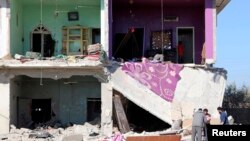At a new graveyard in a Jordanian border town near the southern Syrian city of Deraa, burial space is already running out.
The "Syrian Martyrs Cemetery" accepts victims from the city across the frontier where Syria's civil war first broke out four years ago. That city no longer has a functioning graveyard of its own, since its cemetery has become a battlefield.
"When battles rage, I just know there are many wounded who will be coming to Jordan and become martyrs," said Abdullah al-Zubi, a 32-year-old ex-farmer and now a graveyard volunteer. He has helped wash and bury the bodies of hundreds of fighters and civilians who died of wounds after being rushed across the frontier or perishing in Jordan's refugee camps.
Still, the war's end grows no closer.
The outside world is growing numb to suffering from Syria's civil war, which has killed hundreds of thousands of people and driven nearly 12 million — half the population — from their homes over the past four years.
For those who fled Deraa, where fighting first broke out four years ago after a violent government crackdown on "Arab Spring" pro-democracy protests, every day is a particularly bitter reminder of what might have been.
Back in 2011, when demonstrations swirled across the region and had already brought down strongmen in Egypt and Tunisia, residents of Deraa took to the streets to protest against police abuse of teenagers arrested for spraying graffiti that criticized President Bashar al-Assad.
Most envisioned a popular uprising that would swiftly sweep Assad from power and bring democracy after four decades of one-family rule. It didn't work out that way.
"We never expected for a moment that we would reach the situation we are in," said Ayman al-Jamous, a former state employee from Deraa.
'Wood on the Fire'
Today, Assad still rules in Damascus and parts of the west, while most of the rest of the country is in the hands of Sunni jihadist fighters from al-Qaida's branch the Nusra Front, or Islamic State, known in Arabic by the acronym Daesh.
The war carries on with its own relentless logic. People see no end in sight.
"Most of the youth are like wood in a fire: fueling this war that will not benefit us," said Massoud al-Haurani, a Syrian trader in the northern Jordanian city of Irbid.
"At first it was clear, the revolutionaries — the Free Syrian Army — against the regime. But now with Daesh and radical forces fighting and rise of extremism, people are much more fearful for the future."
Around Deraa, many of the more than 1 million inhabitants in towns and villages in the lush Huaran Plains have either fled to Jordan or moved to safer villages. The economy of what was once Syria's breadbasket has been destroyed.
The city itself is split between neighborhoods still held by the government and the rebel-held old quarter near Ramtha where most homes lie in ruins from street fighting.
In the government-controlled part, state employees are paid but people struggle to survive with spiraling prices, power outages and fuel shortages. In the rebel-held countryside, war is now the major employer.
"Everything has changed and everything old has gone. Now people have no work and most youth are with the rebels," said 27-year-old Jafaar al-Sharif, a computer programmer who now lives in the Syrian border town of Nasib next to the official crossing with Jordan.
Despite their lack of hope that they will ever see the Syria they once dreamed of, many people of Deraa say they would still never accept a solution that leaves Assad in power.
"In a moment of despair, I ask: What have we done to ourselves?" said Jamous, the former state employee. "But in a moment of tranquility, I say that even if I have to give up my children, I would not make peace with the regime."





